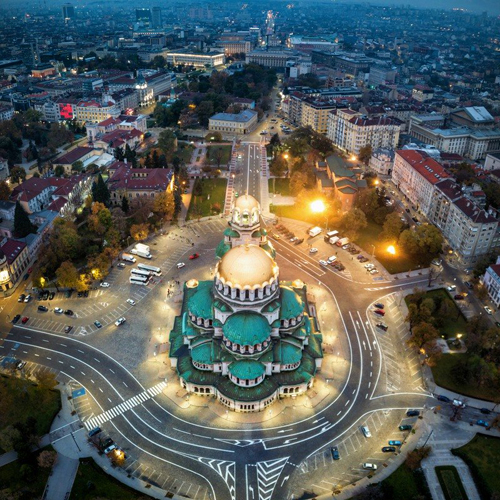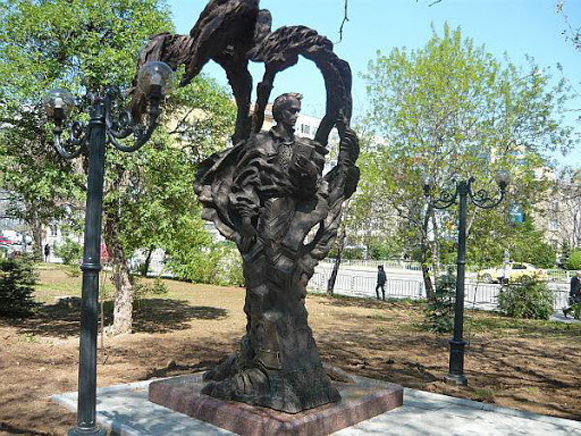Bulgaria
Bulgaria (Болгарія; Bolhariia; Bulgarian: България). A predominantly Slavic country in southeastern Europe occupying the eastern portion of the Balkan peninsula. Settled originally by the Thracians, Bulgaria was conquered by Rome in the 1st century AD and by Byzantium in the 4th century. A Bulgarian state existed from the 7th to the 14th century; in the 11th and 12th century it was a Byzantine vassal state. Under Ottoman rule from the late 14th century, Bulgaria became an independent monarchy in 1879 and a Communist people’s republic in 1946. In 1989 the ruling Communist Party was ousted and Bulgaria adopted a democratic constitution on 1991. Its present territory is 110,993 sq km in area. In 2019 Bulgaria had an estimated population of 7,000,039, 76.9 percent of it Bulgarian, 8 percent Turkish, and 4.4 percent Gypsy. The country’s capital is Sofia.
Political relations between Bulgaria and Ukraine originated in the early period of Kyivan Rus’. Conflicts between Bulgaria and Prince Ihor of Kyiv arose as early as the 940s. Prince Sviatoslav I Ihorovych took part in the wars between Byzantium and Bulgaria. In 968 he captured the town of Preslavets (Pereiaslavets), an important trade center at the mouth of the Danube River, but was forced to relinquish it when the Pechenegs attacked Kyiv. In 971 Sviatoslav’s forces marched through Bulgaria and with Bulgarian support fought the Byzantine emperor John Tzimisces. A Bulgarian monk and scribe, Gregory, was adviser to Princess Olha. One of the wives of Prince Volodymyr the Great, the mother of Saints Borys and Hlib (Bulgarian names), was Bulgarian. From the end of the 10th century and the adoption of Christianity, cultural relations between Bulgaria and Ukraine were particularly important. Along with the first liturgical books, the Church Slavonic language (the language of the Southern Slavs, including the Bulgarians) was brought to Rus’ and became the literary language of old Ukraine. The absorption of a foreign literature by Rus’ was strongly encouraged by the close ties between Rus’ and the Bulgarian patriarch of Ohrid in the first 50 years after the Christianization of Ukraine. Along with translations done in Ukraine, earlier translations done in Bulgaria of liturgical books, sermons, the Menaion, Zlatostrui, the Theology of Saint John of Damascus, the version of the Shestodnev by John, exarch of Bulgaria, the Chronicle of John Malalas, the Chronicle of Constantine Manasses, Izbornik of Sviatoslav (1073), Izbornik of Sviatoslav (1076), and On Poetics by the monk Khrabr spread throughout Ukraine. As well, a few original works by Bulgarian churchmen, such as Bishop Constantine of Preslav’s Uchitel'noe ievangelie (10th century) and some apocrypha of unquestionable Bulgarian origin (they contain traces of Bogomilism, which was widespread in Bulgaria in the 10th and 11th centuries), scribes (knyzhnyky) also came from Bulgaria to Ukraine. Old Ukrainian literature developed under Bulgarian and Byzantine influence and soon began to spread to Bulgaria (eg, the Lives of Saints Borys and Hlib and Saint Theodosius of the Caves) and to influence Bulgarian literature. Byzantium’s conquest of Bulgaria in 1018 and its subsequent dominance until the end of the 12th century put an end to Bulgarian literary creativity.
During the second Bulgarian kingdom (1187–1396) the Bulgarian rulers appealed to the Rus’ princes for help several times. The Bulgarian prince Ivan Asen II lived in exile for 10 years in the Principality of Galicia-Volhynia and with its help recaptured the throne in 1218. I. Rusyn of Ukraine was a Bulgarian military leader and fought against Byzantium. When Kyivan Rus’ was conquered and Kyiv was sacked by the Mongols in 1240, Prince Yakiv Sviatoslav found refuge in Bulgaria, where he ruled its northwestern part. The political renaissance of Bulgaria was accompanied by increased literary activity and the growth of Christian mysticism. The main representative of this movement was Patriarch Euthymius of Trnovo (1370s–93). He directly influenced Metropolitan Cyprian of Kyiv (d 1407) and another Kyivan metropolitan Gregory Tsamblak (1415–19), both of whom were Bulgarians. The influence of this Trnovo school is apparent in the strong ascetic and mystical sentiments, the rhetorical quality, and the ornamental style of the literature of the 14th-15th century.
During the period of Turkish domination Bulgaria found cultural support in Ukraine, especially in connection with the Orthodox renaissance in Ukraine at the end of the 16th century. The publications of the Kyivan Cave Monastery Press, established in 1615, reached Bulgaria and other Orthodox countries. In 1671 the Kyivan Cave Monastery published for the first time Patriarch Euthymius’s Sluzhba s zhytiiem Ivana Rylskogo (which is about the popular Bulgarian saint and founder of the Rila monastery). In the first half of the 17th century the Zaporozhian Cossacks staged a series of attacks on Varna, Balchik, and other coastal towns of Bulgaria. A Bulgarian archbishop, P. Parchevich, representing Austria, negotiated a military alliance with Hetman Bohdan Khmelnytsky against Turkey (1657).
Ukrainian-Bulgarian ties became closer at the end of the 18th and the beginning of the 19th century, particularly because Bulgarian merchants appeared in Odesa. During the 18th–19th century many Bulgarians studied at the Kyivan Mohyla Academy. In the first half of the 19th century Odesa became an important center of the Bulgarian cultural movement known as the Bulgarian national renaissance. A Transcarpathian Ukrainian historian and writer, Yurii Venelin (1802–39), played an important role in this renaissance. He traveled through Bulgaria, collected a large amount of historical and philological materials, and founded Bulgarian ethnographical studies. In 1829 he published Drevnie i nyneshnie bolgare (Ancient and Contemporary Bulgarians) in Moscow. The book had a great impact on Bulgarian national consciousness. In 1845 one of the first books of Bulgarian poetry in the 19th century, N. Gerov’s Stoian i Rada, was published in Odesa. Bulgarian writers of the 19th century were keenly interested in Taras Shevchenko, and many of them were clearly influenced by him, as Bulgarian critics point out. R. Zhinzifov (1839–77) was influenced by Shevchenko, particularly in his Krvava koshulia (Blood-stained Shirt, 1876), and from 1863 on published a number of translations of Shevchenko’s works. The founder of modern Bulgarian poetry, P. Slaveikov (1827–95), translated Shevchenko and was influenced by him. The most prominent Bulgarian writer of that time, I. Vazov (1850–1921), turned to motifs found in Ukrainian oral folk literature and in Shevchenko. The writer and ethnographer L. Karavelov (1835–79) studied Ukrainian folklore and Ukrainian ethnographers and was influenced by Hryhorii Kvitka-Osnovianenko, Marko Vovchok, and Shevchenko, whom he also translated (1870–3).
Many Ukrainian volunteers fought for Bulgaria’s liberation in the insurrection against Turkey and in the Russo-Turkish war (1877–8), when the idea of liberating the Slavs from Turkish rule was very popular. Later cultural relations between Ukrainians and Bulgarians were particularly influenced by Mykhailo Drahomanov. As a professor at the University of Sofia (1889–95), he made important contributions to the study of Bulgarian folklore. Drahomanov’s grandson Dimitar Shishmanov collaborated in 1915 with the Union for the Liberation of Ukraine. The leading Bulgarian historian, Marin Drinov (1837–1906), was a professor at Kharkiv University and took part in the work of the Kharkiv Historical-Philological Society. In 1890–7 he was its president. Many Bulgarian scholars were full members of the Shevchenko Scientific Society, among them M. Arnaudov, G. Bonchev, A.T. Ishirkov, L. Miletich, S. Petkov, and Ivan Shishmanov.
In 1918 the Peace Treaty of Brest-Litovsk led to diplomatic relations between Ukraine and Bulgaria. The first Bulgarian envoy in Kyiv was Ivan Shishmanov, a long-time supporter of Ukrainian statehood and Mykhailo Drahomanov’s son-in-law. The Ukrainian envoy in Sofia was Oleksander Shulhyn and then F. Shulha.
In the 20th century Ukrainian-Bulgarian relations were restricted for the most part to the cultural sphere. Bulgarian writers translated Ukrainian literature. I. Belev, Diiamantin (pseudonym of A. Ikhchiev), S. Drinov, S. Chilingirov, and Kh. Tsankov-Derizhan translated the poetry of Taras Shevchenko. P. Todorov translated Vasyl Stefanyk and Olha Kobylianska. Kh. Tsankov-Derizhan and others translated Ivan Franko and Oleksander Oles. Ivan Shishmanov, S. Mladenov, S. Chilingirov, M. Arnaudov, S. Stanimirov, N. Balabanov, D. Strashimirov, and others wrote on Ukrainian subjects, particularly on Ukrainian literature. The works of Soviet Ukrainian poets and writers such as Pavlo Tychyna, Mykola Bazhan, Yurii Smolych, Andrii Malyshko, Mykhailo Stelmakh, and Oleksander Korniichuk were published in Bulgarian. From 1917 to 1974, 1,105 works of Ukrainian literature were translated into Bulgarian.
After the Second World War and the peace treaty of 10 February 1947 (see Paris Peace Treaties of 1947) between the Allies, including the Ukrainian SSR and Bulgaria, relations between the two countries became fairly close. In 1958 the Ukrainian Department of the Society for Soviet-Bulgarian Friendship was established. The Bulgarian consulate general was located in Odesa from 1966 to 1971 and then was located in Kyiv. A Bulgarian consulate has existed in Odesa since 1971. Each country’s theater and choir groups toured the other country. The prose works of I. Vazov were published in Ukrainian, and the poetry of Kh. Botev were translated by Pavlo Tychyna, who was elected corresponding member of the Bulgarian Academy of Sciences. The poetry of L. Karavelov and L. Stoianov and a collection of selected poems by Bulgarian poets were translated. From 1894 to 1962, 173 works of Bulgarian literature were published in Ukrainian translation. However, political interference of the Soviet authorities considerably impaired Ukrainian-Bulgarian co-operation.
The economic relations between Bulgaria and the Ukrainian SSR were mutually beneficial. Almost 100 percent of Bulgaria’s imported coal and cast iron, 40 percent of its coke, 60 percent of its iron ore, and almost 50 percent of its ferrous metals came from Ukraine. Bulgaria accounted for 10 percent of Ukraine’s foreign trade. The Ukrainian SSR took part in constructing 100 of the 180 industrial projects built with the aid of the USSR in Bulgaria up to 1970.
In 1920–44 a small number of Ukrainians lived in Bulgaria. Almost all of them were veterans of the Army of the Ukrainian National Republic. They lived mainly in Sofia, Plovdiv, Sliven, Vidin, Ruse, Burgas, and Varna. Ukrainian organizations such as the Ukrainian Hromada in Bulgaria and the Ukrainian Alliance in Bulgaria and their branches were active in those years. In 1934 the Union of Ukrainian Organizations in Bulgaria was formed. The most prominent figures in the Ukrainian community were Col Fylypovych and the sculptor Mykhailo Parashchuk. In 1920 the Bulgarian-Ukrainian Society was established in Sofia. It was organized and headed by Ivan Shishmanov and remained active until 1944.
BIBLIOGRAPHY
Tikhomirov, M. ‘Istoriia sviazi russkogo naroda s iuzhnymi slavianami s drevneishikh vremen do pol. XVII v.,’ Slavianskii sbornik (Moscow 1947)
Snegarov, I. Dukhovnokulturny vruzki mezhdu Bulgaria i Rusiia prez srednite vekove (X–XV v.) (Sofia 1950)
Mandryka, M. Z bolhars'ko-ukraïns'kykh vzaiemyn (Vplyv Shevchenka na bolhars'ku poeziiu) (Winnipeg 1956)
Dmytruk, V. Storinky vikovoï druzhby: Z istoriï ukraïns'ko- bolhars'kykh zv’iazkiv XIX–pochatku XX st. (Lviv 1958)
Atanasov, P. ‘Z mynuloho bolhars'ko-ukraïns'kykh zv’iazkiv,’ UIZh, 1960, no. 4
Shumada, N. Ukraïns'ko-bolhars'ki fol'klorystychni zv’iazky (Kyiv 1963)
Shyl'ova, O. T.H. Shevchenko i bolhars'ka literatura (Kyiv 1963)
Sokhan’, P. Sotsialisticheskii internatsionalizm v deistvii: Ukrainskaia SSR v sovetsko-bolgarskom ekonomicheskom, nauchno-tekhnicheskom i kul'turnom sotrudnichestve 1945–1965 gg. (Kyiv 1969)
Khrusanova, V. Ukrainska s"vetska khudozhestvena literatura i literaturna kritika v B"lgariia, 1917–1974: Bibliografiia (Sofia 1974)
Stepovyk, D. Ukraïns'ko-bolhars'ki mystets'ki zv’iazky (Kyiv 1975)
Sokhan', P. Ocherki istorii ukrainsko-bolgarskikh sviazei (Kyiv 1976)
Mykola Hlobenko, Oleksander Ohloblyn
[This article was partially updated in 2020.]


